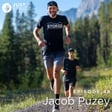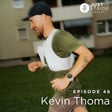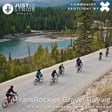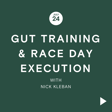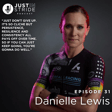Introduction to Justin's Drive Podcast
00:00:03
Speaker
Hello, and welcome to the Justin's Drive podcast. I'm your host, Justin Puyese. If you love endurance sports, you've definitely come to the right place. On this show, we'll talk to athletes, coaches, and professionals who can help us reach our true potential. Being a student of distance running for over 10 years and interviewing people in the sport for the last five, I've learned a ton, but there's always more to discover. Everyone has a story, and I know you'll resonate with each of our guests as we embark on this new journey together. Join us at home, on the road, or while you run. Together, we'll have some fun.
Sponsorship and Discounts
00:00:39
Speaker
So follow along on Instagram at justinstridepod and your favorite podcast platform and prepare to be inspired. Come along for the ride with Justin Stride.
00:00:51
Speaker
This episode is presented by our friends at Exact Nutrition, a tasty and healthy way for you to fuel your body before, during, and after a solid training session. I can't leave the house without a few fruit bars in my pocket and they never make it back home. Exact is offering you 50% off your order when you use the code justinstride. So head to exactnutrition dot.com and fuel your goals today.
Importance of Nutrition and Rest
00:01:14
Speaker
When I first got into the endurance world, I was mainly focused on the training aspect. But as I've learned and grown over the years, I've discovered that there is way more to it than that. Nutrition, rest, strength, and sleep all play a major role in how we improve as athletes. If you're interested in taking the next step, ask yourself which of these aspects do to you know little to nothing about, and take some time to learn more. You might be surprised how much of an impact it can have on how you perform.
Moritz Kynan's Athletic Journey
00:01:44
Speaker
On this episode of Justin Stride, I broke down the success of the lead Swiss marathoner and coach, Moritz Kynan. Moritz played hockey and football growing up, but actually didn't enjoy running at all. It was only after a knee injury that he decided to give running another shot so he could get movement back in his life. Today, running has become much more for Moritz. It was a way to connect with his parents, who were also passionate about the sport, a way for him to push his own limits. and also brought him closer to his local running community. He's made huge strides in the marathon, now running at a semi-professional level and hopes to better his time at the Berlin Marathon later this year. Moritz, welcome to the Justin Stride podcast. I really appreciate you taking the time. Hi, Justin. Thank you very much for inviting me. It's a pleasure to be on.
00:02:36
Speaker
Yeah. I mean, and you're taking time out of some, some precious trading time too, up in, in some rates, as I understand it, you're up there trading now. Yes, exactly. So it's going to be here for three weeks, training at altitude. Um, super excited to be on anyways, you know, like training camps are the usual, uh, where they miss eat, sleep, train, repeat. And yeah, I'm between happy to make time. And is that, is that something you're doing like regularly in your, in your seasons that you, you go up there for altitude training and do you find, uh, is there a sweet spot in terms of amount of time that you like to be up there?
00:03:12
Speaker
Yeah, I think there is, um they're I think you you need to be able to spend a prolonged period of time at altitude to actually really feel the the impacts from it, because at least in my experience, it takes at least a week to fully adapt. So for example, if I go to altitude the first week is maturity, easy training. and I don't train based on pace. I train mature at the early heart rate because you feel the altitude, the difference is is is is significant. ah your heart rate is going to be higher not only in in in in the training itself but also in recovery which means your recovery time slow down so it's very important to sort of ease yourself into it that you don't put too much stress on your body for too early early on because otherwise you're going to kind of kind of ruin the entire time you're spending up here and I think having a prolonged period of time is also as shown to be effective because that's actually when you get the benefit of producing more red blood cells right because you're getting less oxygen while you're trained
00:04:10
Speaker
um So yeah, I would don't really recommend, I think there's a rule of thumbs to sort of say two to three weeks at least. So for one week, I would normally not recommend it because it's still nice, right? It's beautiful surrounding. So if you're just here for, you know, running in the mountains with like snow covered caps and stuff, that's beautiful on its own, right? But if you're really looking for the training benefit, I'd say the longer, the better. And is there a point in your training block that you like to add in altitude training? Like at what point is it benefit like, is there a benefit to put it in at the beginning versus at the end or like right before a race? Yeah, I think most people would go right before a race. Um, but then again, this is highly individual. Um, some people take quite a long time to adjust to altitude. So like I said, like rule of thumbs is a week or 10 days, um, to until you sort of are back to.
00:05:04
Speaker
like normal levels i as you would have at the altitude you normally train at and but it's also dependent on how much like relative how much how much higher are you so for example come from Zurich which is roughly 500 meters above sea level design mortgage is like 1.8 or 1800 meters above sea level takes the more that the larger the gap gets so of course the longer it takes to accommodate or adapt to the change in altitude um but yeah normally I would say it's good if you go um like right before a race but then it's also a question of when you go back to your regular trading altitude because I've heard from many friends and I think there's some solid science around it but then again right it's
00:05:46
Speaker
Science gives you certain expectations or sort of an expected value, how long it takes to re-adapt to being back at your normal altitude levels. But then I know people come back and they take a long a long time to sort of like get back to the rhythm they have at their usual training grounds. so Yeah, I would usually recommend doing it right before a race, but then in my case, not being a professional athlete. Um, it also is a bit of a question of how can you make it work with your profession and private obligations and all the other stuff that feeds into your training. Cause you're, you're doing it like semi-professionally, but like you still have to balance other aspects of life while you're up there doing training. Like you're working there too, right?
00:06:30
Speaker
Absolutely. Yeah. So for example, this week I'm working like I normally would. Thankfully, I have an employer who really is flexible on that, who allows you to, for example, work one entire week but um remote, which is really, really cool. um But yeah, that's something that you definitely need to consider, especially if you're not 100% professional, don't live off the sport. It's it's something to definitely keep in mind. And so we spoke a bit before we started recording, but are you up there with a team? Are you up there solo? Or how how do you kind of you know manage that? Do you go up with a training group, let's say? Are there professionals around friendly with you? you know
00:07:10
Speaker
Yeah, exactly. I think there is, and there's it's actually a mix of people. um Some ah pros I know are currently training up here. So it's also very much at that in mind when I booked this was like, okay I know people who are already up, which is always fun to train with a group and especially with the background that is very international. A lot of people up here arere are preparing for Paris. So you will have very good athletes around that you can just like hook up with and say like, let's go for a run together or meet for coffee or, you know, like, and then you meet through the circles and you get like a more and more like a bigger portfolio almost, if you will, of contacts you can meet up with. and But at the same time, I have some people from our world running club actually coming up. um
00:07:51
Speaker
which is international learning club Zurich. Um, one of them is already with me now here and then two more are coming on the weekend. So we're making this almost like in a mini training camp capacity too. And are, is everyone striving for the same things, maybe within your team or like, I know with other professional athletes up there, they're, they're training for different sports, you know, maybe some triathletes and specific race, specific track athletes too. I'm sure. Yeah, it's, it's a mix. It's, um, Some people who come up or I mean most people I know naturally are marathon runners too. um So of course also the pros I train with I mean this are the women pros to be very precise here because the men pros are too fast for me anyway. um But yeah I know most of them are also long distance runners but of course you can also meet for example this morning or no sorry yesterday morning or somebody else for a group run at eight in the morning on a Sunday and I was like
00:08:43
Speaker
Why on earth to go on and run at eight in the morning on a Sunday? It's a Sunday people, please. I want to sleep in. Um, but then one of them said, yeah, I'm
Coaching and Training Insights
00:08:51
Speaker
a, she, she's a triathlete, right? And she's like, yeah, I have to do a run in the morning and a bike ride in the afternoon. It's like, okay, I totally get it. Then you need to get the run on a date. I understand. who Yeah, you gotta have that. Yeah. You don't know what people are doing or maybe they're doing double double training sessions. exactly So does it make it difficult for you to follow your own plan? Maybe you're tempted to run with other people, do their sessions too. It is, it is very tempting, right? I mean, but what we do, at least the people I know who up here are very relaxed. and This generally something I've come to notes about professional athletes, even though they have very set training plans, they're not afraid to move some things around or sometimes go a bit slower or a bit faster. It's like quite, it's a very relaxed atmosphere when it comes to that.
00:09:35
Speaker
But what we usually do is we just send each other like the week's plan what we have basically on our menus and then you see okay where does it add up where you could maybe fine tune something and then me not being professional I'm more a bit you know I'm a'm more relaxed and naive and I'm sort of like okay I don't have a problem adjusting to your schedule because you're getting ready for Paris so you know your priorities definitely are more important than mine. yeah well Yeah. I think, you know, we each all have our individual goals, right? And absolutely yeah we're striving for. So, and so are you building up those plans for yourself? Are you doing it yourself? Are you coached or, you know, how does that work?
00:10:12
Speaker
I actually coach myself, and and I'm also the head coach of International Running Cup Zurich. This is actually a very good sort of lead way into sort of my background, right? So I started running when I was 25, 26. I went in an ACL tear. I was still playing football at the time. and And on the way back from rehab, I wasn't allowed to do a lot of high-impact sports, sort of a change of directions. And football specifically, right, is very renowned for ACL injuries. and So I had to ease off of that for like almost half a year. And then on the way back, I was was starting to run already and then I felt like, okay, I'm very good shape now running wise. So maybe let's try to run a half marathon.
00:10:55
Speaker
And I think I've done once one before that, but I was like, okay, now I'm really feeling better or like faster as well and fitter, so let me see what's the difference. And then I was like, okay, while I'm at it, I might as well just run a marathon because why wouldn't you, right? yeah yeah and Sort of like a middle-life crisis of age 25 or 27, I think it was at the time. um And then, yes, so I ran my first one then ah that I did that was in Zurich. And then the second one came in New York with my mom, actually, which was her quite a cute story because she wanted to run New York. She she used to run a lot as well. Also started quite late. and She wanted to run in New York in 2001, which obviously was a bit of an.
00:11:36
Speaker
issue considering what happened because that was literally like the week after or something like after 9-11 happened so she always had this on her on her bucket list and then she asked me when I ran Zurich she's like you do you want to come to New York with me let's do this together I was like yeah I'm absolutely down for that um So yeah, that's how sort of how my running journey started. And then I sort of, I struggled with at that point, sort of balancing playing football still regularly, like with two to three times training a week, plus a game on a weekend, then running also or getting more and more into running. I sort of struggled to, let's say, get better or get faster at running. So at some point I started to read into what you actually could do, like boys,
00:12:19
Speaker
what this What is your body basically doing when you run? What do you need to do to get better at it? And that's sort of when my interest sort of kicked off into getting in all to the theory. And when I started to write my own plans, I didn't use apps anymore at the time. I was trying to think around with it a little bit. um And this really then accelerated when the COVID lockdowns came around, when we sort of all of a sudden had more time, because work has become obviously way more flexible, and more time to train as well, because you didn't have to commute to work anymore, like an hour or almost two hours a day. um When then we sort of have a bunch of friends, we sort of sat together with like, how should we like schedule our training? What does the science say? Because a lot of them have a scientific background as well. So we're sort of like, okay, what do we need to focus on? What's important?
00:13:06
Speaker
That's sort of when it all kick started. And so, and I just want to ask, did you run that marathon with your mom or did you just go to New York to run a marathon and you ran your own race and she ran? No, we ran our own races because I mean, that was already quite, let's say, quite, quite a different, different setup. But no, it was just cool to do anyways. It's going to trip together for, for, uh, no, no, we didn't run, run together on the race itself. We never really hit the bars afterwards together, which is really important if you ask me. And what did you think of, what did you think of the race of the world major that is New York City?
00:13:41
Speaker
um Amazing. um i mean i've I'm a six-star finisher now, so I've done them all. and And people ask me sometimes, which one is your favorite? And it's very hard to answer, I have to say, because it really depends on the perspective. If you want to know which one is the fastest, yes, I'd say it's probably Berlin, Chicago, or Tokyo, which is just the fastest races. But in terms of ambiance and the whole vibe around the races, I would say it's Boston or New York. London was also very special, I have to say. It's very difficult to answer, but I think in terms of the crowds and the energy, it's probably New York, yes.
00:14:19
Speaker
Yeah, New York is wild with all the the five boroughs and the massive bridges that you have to cross. and yeah i mean It's definitely a vibe. really interesting funny like Funny science story, first time I ran in New York, I still ran with headphones in um because it was very much an amateur at the time. and Uh, I recall very, very vividly when I was running because you started on a bridge or at the start, right? Then you crossing over into Brooklyn. I went, I arrived in Brooklyn. The people were so loud that even if I had my volume full up on the headphones, I couldn't hear the music anymore or barely because the crowds were going so rowdy. And that just, you know, it was an amazing feeling. I can only, can really only recommend it to everyone who wants to run a marathon, go run in New York. It's it's it's insane. Yeah, it's amazing.
Motivation and Personal Growth
00:15:06
Speaker
It's just a whole different experience. It's it's very really it's really awesome. it's ah It's a party for sure, right? And so what are you listening to? What were you listening to when you were running those days? ah Good question. I think it was a lot of a lot of electronic music often. or i yeah I still sometimes run with music now, especially if I if i go for like easy, very long runs and I'm on my own. And it's for me, it's often music that has some emotional attachment. um But it depends a bit on what kind of workout I'm doing. So if I do something where I want to run really fast and hard, of course, I choose something that gives me that energy. But if I just want to phase out on an easy run, which is, for me, easy runs, I almost have like a meditative ah background, then I choose something that
00:15:53
Speaker
some sort of emotions attached to it because it helps me to sort my brain in a way that makes sense, yeah yeah i like to calm down and organize things. Totally. I once did a marathon on a playlist that was, and that I built off of people in my life, their favorite songs. yeah So I had like awesome enough songs to last, let's say what my target was. And then when those songs would come up, you know, every four minutes or so, then I wouldn't remember that person and and whose song it was. So and that's amazing. That's actually a super, because that's actually a super cool idea. i have to say i like yeah But I don't run with music anymore. I think it's triathlons fault that they kind of.
00:16:32
Speaker
Cause you can't run with music. So I just kind of saw. Yeah, that's true. So I want to now go back to what you were saying about like, uh, you know, you were using apps for your training and then you stopped using apps and started doing your own research. So where do you think like, you know, a lot of people, when they start to get into apps and and just to, you know, which is good, it's a good way to start and stuff. But where do you find the main difference in terms of like what you can get either through a coach or by, you know, building plans that are specific to you versus what you get with an app? Yeah, I think there there is, I would always say and having a financial econometrics background, I always say i would always think in a normal distribution. So I think for most people, an app or a standardized solution works perfectly fine because you are within the realm of these models that are getting used by these apps.
00:17:22
Speaker
Um, are being calibrated on. So if you would say you're someone who does, you know, as, as maybe run a couple of half marathons and marathons already, um, or you just have some running background or sports background, even you don't start at zero. I think an app can be a very good way to kickstart your your journey. um I think where a coaching approach is very much or brings value at is at the both tails. So either if you're completely new, you have not done any and sports in your past um or you're already at a very good level, then actually having a coach who tailors the approach for you does bring a lot of benefits because just needs this little bit of extra attention um that allows you to excel or to sort of like level up if you will.
00:18:09
Speaker
And also like you can make adjustments too with a coach, I find. yes you know I mean, this is the second point I would also mention is it depends on what you want to have in a coach, right? It's some people want to have a coach for the benefit of having someone who actually knows how to structure a plan or to they want to sort of like acquire the know-how, if you will. um But there are also people who need a motivational side or the personal side, which is equally important to the side to the to the side of know-how. right it's sort of it's It's equally the same weight, I would say.
00:18:44
Speaker
And you're absolutely right. Some people who are maybe could also train with an app perfectly fine and get the same benefits. Maybe they need someone who actually advises them and also gives them comfort, especially more difficult moments, right? For example, if you're injured, you have a niggle, you have to maybe have to take a couple of days off from your sport, which as you probably know yourself, drives everybody a bit crazy. and Then the coach can really add value too, because you can have someone who tells you everything's fine. you've been there before or we've been there before, or it can also, you can tell a story from your experience that helps people sort of say, okay, everything is good going to be okay. Yeah. Yeah. And I think it's really that too, from the experience background that you've done, tested, tried these things out yourself. Um, and you can share those little tips and tricks because, you know, you don't always think about, you don't ah always think of everything. I think about all the mistakes I made early on when I knew nothing about
00:19:41
Speaker
community or culture. I had no running friends at all. And it just like driving to races by myself and training, you know like just running fast all the time, you know four days a week and same routes and stuff. And yeah, there's a lot of benefits certainly to to gain from from somebody with more experience. Moritz, maybe take us back to like the real beginning, to like where you're from, where you grew up. like Did you have this in you, this running thing? I know you're into sports and stuff, but like what gives you this maybe What gives you this drive to learn and and become a better athlete? Yeah, that's actually an interesting question because there it's I don't know, it's like maybe four weeks ago or something, my dad handed me some photos of me like running in some um like local races when I was, I don't know, maybe like 10.
00:20:30
Speaker
And I absolutely hated it. So I was like, even as a young child, like my my parents used to compete in races on their own. Then it brought us alone to compete, or my brother myself, to compete in kids races. Apparently I was like crying on the way while winning at the same time, because I hated running at the time. and And I think that persisted for for a long for a long time, because I then grew up playing ice hockey for a bit quite a bit, for a good 10 years. and Then I switched into a football playing, which something I also did when I was a bit younger. um And running for me really wasn't. i Even when we had fitness tests there, I hated it a lot. like I didn't want to do it. um And yeah, I think the only thing I think
00:21:17
Speaker
helps when you come from a different sport is you're reused to a specific training regime. You're used to be going to training two or three or four times a week and then maybe even a game on Sunday or on the weekend in general. Now I think this sort of mentality of knowing you have to dial in your sort of like your your routine to a certain degree to get better really helps regardless of what sport you do could also be the same if you have a hobby like if you're you're trying to be a musician. It's the same concept that's about discipline, and it's about willpower. It's about getting the, just, you know, locking yourself into certain degree. And I think the second point where it really, really helps to with running is that. Desire for incremental change to sort of know, Hey, this week we can have a bad game. I train hard over the next week or over the next couple of weeks and I'll have a better game. I think this is what you learn very early on, regardless of what sports you grow up with.
00:22:16
Speaker
And like you, you hated running, right? But then you got into team sports. So was that like self, was that something you did on on your own or was it like your parents put you in sports or did you follow your brother? Let's say or a little bit of both. Um, no, because I was, I was ah probably not the most, uh, I was always a child with a lot of energy, but I am probably maybe I struggled at the time to really like focus it on a specific thing, but I also didn't like doing activities or hobbies that I wasn't good at already. So it was really like, if I don't know it, I don't want to learn. um Which is interesting because I'm a complete opposite right now, or like in my current stage in life, right? It's just like interesting to look back to. and But yeah, I basically felt like my my parents then sort of pushed me into doing sports, but not in in a sort of like, a I would say an unhealthy way, in a very healthy and um approach, sort of saying, you need to get rid of that energy you have, you need to be active.
00:23:14
Speaker
and my brother played ice hockey as well so they thought like they bring me there too um and then I think the football thing was a bit separate but then I also like picked that up a bit later when I was probably like 14 or something like that again um or 16 somewhere around there so that there the motivation the intrinsic motivation already sort of started to develop a bit more than when I was younger. And did you, like, as you went along in sport, did you ever see yourself as a professional or semi-pro athlete or know the what were the goals kind of going through your teens and into, you know, into your twenties kind of thing? It's interesting because when I was in my, let's say early or like teens and then early twenties, I was, my hobby was going out partying and, you know, enjoying life, basically.
00:24:00
Speaker
um So that wasn't wasn't really under radar at all and even now a days i sometimes when i run a good race or for example in in Zurich i came in 15th at the Zurich marathon i think was ninth in the Swiss championship when i saw these numbers just like beyond belief honestly like i'm just seeing that i'm like ah how on earth did that happen? like How did it come to form? It feels surreal to me still sometimes. um But yeah, it's I think it comes from that shift in focus, from being
00:24:34
Speaker
having completely different priorities for a very long time than moving into a sport. I would say it's just more a catalyzation of my own motivation and I always say to people who get into running most people have to say or any kind of hobby can also be different real completely different related. But I'd say a lot of people who pick up running, they pick it up because of a reason, right? It could be of half concerns to say, I want to lose weight. Or they could say, hey, I went through a terrible breakup. So let's, you know, let's, I want to redefine myself. But I think ultimately, or like I did with an injury where it's like, okay, I just can only do running for the time being. So let's give this a try. I personally really believe that, um,
00:25:18
Speaker
Most people who get into the sport, especially at the later stage, they don't really believe they would become very fast, even though I firmly believe that everyone has the possibility, the capacity to do so if they really work hard for it. But I think the key is if you can make that switch from being extrinsically driven, from having someone ah or something that sort of makes you pick up the sport in the first place to translate that into an intrinsic motivation. meaning that at some point you realize, hey, I'm actually not doing this anymore because I want to prove something to a specific person or I don't want to prove something to myself because I was injured, because I actually really enjoy the process of getting better and I'm getting, I sort of, I'm able to reward myself for all the hard work I put in.
00:26:07
Speaker
Yeah. And it is that it's, and it's a, it's a continuation and a consistency that you have to put in in order to get better. Right. Um, and I mean, that goes for anything in life, but you see that yes specifically in running, right? Like, um, or what we're talking about now in your journey. Um, can you pinpoint something that helped you really progress in the sport? Like was there, was there a moment or was there, uh, something that you changed up that really like. gave you a big boost in in your like performance? like was there you know Between performances, let's say, where did you see the greatest improvement and why why do you think that happened?
00:26:47
Speaker
um Yeah, I think that's very easy to pinpoint because I was doing the lockdowns, like the lockdowns from COVID, right? yeah I think there are multiple reasons for that. I was already more getting into running before, but I think the lockdowns first, it's the first time really allowed me to really focus on it or like to um sort of like almost assign more of my capacity to it because I had more time to train. I also had more time to actually look at what do I need to do differently to get better. and And then also the fact that I had an amazing group of friends who I was able to train with during lockdown where we were like, yeah, you can't do anything else
Community and Club Formation
00:27:25
Speaker
anymore. So let's just meet for runs. And there are so many cool stories in there because they were able to push each other on to, you know, like one of them started running basically in the lockdowns and she's now a 222 marathoner, right? Sort of like,
00:27:43
Speaker
crazy stories and that surely also pushed myself to sort of being part of that dynamic. But I think also at that point I really found the passion because running and during the lockdowns for me was also um getting sort of wrote almost like some sort of sanity back, right, because we all struggle with being locked inside the entire time your social contacts were limited. So running really became that sort of, um yeah, just this big focus in my life where I could sort of express myself or I find peace but also where I felt like i here I can actually really
00:28:18
Speaker
um focus my energy to improve and to get better and yeah that's where actually where the biggest jump in performance also hit because before COVID I ran like a 254 marathon and then the first race after was like a 235 so it's like a massive jump over like one and a half years. And that's, that's, that really kickstarted it because then I could sort of tell, okay, I can make that much of a jump in such a short time. How far, i how far can I actually take this? So it's where it's basically where I really felt like, okay, let's, let's just try whatever. Let's try and see where I end up. And, and these people, you met them through where they friends already, or did you meet them through the sport or like community runs? Like, how do you get connected with the community? What did it look like at the beginning of your running and and what does it look like now?
00:29:04
Speaker
It's, it's, it's interesting because it's such a mix of life. And it was also a bit the birth idea of the international running club Zurich that we found at last year or like ah formally formed this at the early this year, because it was a group of people. It was people who worked together. It was people who knew those people who worked together. It was people competing from the outside, people who studied, um, who met in some other trainings before. We then just like we formed this group who just tried time trials or like a bunch of them did just like a marathon and in the ah ah like in this area of the Lake Zurich, like at the head of it, like eight la had eight loops around it to keep themselves busy. and But it was a complete mix of people from different walks of life, and which and also like fueled that idea that we have for running club running at the moment is because
00:29:54
Speaker
What I always really like about the sport, and it's not only about running, it's also any other kind of hobby. I could again be a musician who participates in a a big band orchestra, for example. You have so many people from different walks of life who have this one connecting factor, which is sport or a hobby or whatever. And it's just so interesting to see that you have different views on so many things in life, different backgrounds, different educations, but it doesn't really matter. So it was very similar with that group of friends. It's just like people said, like, yeah, I want to join. And you didn't necessarily have to know and any anybody or just, it doesn't matter how fast you are with running. It was just like, yeah, just come along and try your best and just be there with everybody else.
00:30:40
Speaker
And what was the premise for the group? Like, what was the idea for it? Was it just like meet up, do an easy run? Or was there like meet up, do workouts or what was your, how does this run club work? Um, yeah, it's basically the, the idea was ah for, for the time in COVID that group was really just random, like a group chat where people were like, yeah, I'm doing an easy run today. Who's in for turning or someone who I'm doing intervals, right? who Who's up for it. And then you would, people would say, yeah, I mean, or not depending a bit on how fast the people were who were asking you have some people say, yeah, I'm down for it. And some people was like, yeah, I dropped out. Um, but this is sort of where we keep the question. What pace?
00:31:18
Speaker
Yeah, no, because it depends, right? Because I would at that time, I would have said, yes, now it's say like, yeah, it depends on our attitudes, you don't train on pace, right? or are you want hill Also don't train on pace, or no, I do use power. i So depends, right. But um The idea of joining the club really came from there. A, to have this sort of community of people from all walks of life, from different backgrounds, from different nationalities as well, because I liked the international aspect.
00:31:51
Speaker
since it's even a broader collection collection of people from various different cultures as well, which makes it more interesting for me and on a personal level too. And to have all levels and to give them an opportunity to grow, because the way I saw it looking in Zurich and also when I started running, I felt like I don't fit in anywhere. Because either you go to what I would call like community run clubs, which are amazing on their own right for the community aspect and for having like social runs and all that stuff, which is really, really cool. Or you go into athletics clubs that are super professional and you get really good training, but the entry barrier is very high because most people that are already really, really fast. So you feel intimidated.
00:32:36
Speaker
showing a club like that when everyone is like hitting crazy lap times on a track. So I thought we should create something that combines these two factors where you can have a social aspect tied to it. But at the same time, if people want, and this is sort of like an optional um for everyone who joins, they can also prepare for a race. We tell them, all right, you want to get a coach or you want to have someone who can tell you or guide you towards reaching your goals, whatever they may be, turn up. And that's basically where the idea came from. And then with the context of being international, because that's just something that's very much hard to me, that's sort of where the idea came from. And what does international mean to you? Like, is it is it just like where you're from or like your back, your cultural background or what is that? Because like Zurich's pretty, so it's a melting pot, I have to say.
00:33:24
Speaker
It is, yes. and this is And this is also what sort of like surprised me that no one has started something like that in Zurich before, because it's so international. No, but it's it's it's a little bit of everything, right? It could be cultures, nationalities, and whatever the background is. So international is really just with the international we're trying to show, we we're actually open to for everybody. It doesn't matter where you're from. What your thoughts are, what is your opinion? No one cares. right it's just It's about sport. Of course, we do stuff on the side where we go. For example, after the Zurich Marathon, we all went to a pub for like six hours and got stupidly drunk. That's my kind of club. Yeah, exactly. where you can where you can then when you Where you meet people on a different level, which is extremely, yeah it's just a lot of fun. um
00:34:08
Speaker
And yeah, we have people from from all around the world, literally like people from America, people from Ghana, people from Uganda, like from Malaysia. So it's a little bit of everything. And this is something I really appreciate because it just opens up your horizon so much through the connection that running is. Any any so like stories that stand out to you, like of of individuals that have come to your club and and maybe achieved something they didn't think they could do? There are so many already. like We're such a young club still, but even in Zurich, at the Zurich Marathon, the Zurich Half, there were ah people who either ran their first marathon, like one of them is a single mom, already it's difficult to find time to actually prepare for something for for a marathon like that.
00:34:55
Speaker
But rather first marathon was over the moon about it was super happy despite the terrible conditions on the way. Horrible. Yeah, horrible. Yeah, but this really makes me happy because you can tell that someone worked for it despite being that having to do in very adverse conditions or just like challenging conditions. For general life perspective, but also on the race day itself, then we had someone who was 45 and run like and almost like 10 minute PB on the half marathon. And these sort of stories really, really touched me because it's, um it's the meaning behind running, right? It's that that the that gratification we all get. It's also, it's not only running, it's like for triathletes, like yourself, it's the same story, right? You work for something. And then if you have, achieve result of if you achieve the goal, you set yourself, there's nobody feeling right.
Nutrition and Metabolism in Running
00:35:47
Speaker
And then yeah, we have also other stories of people who joined from from the US, did a lot of college running, didn't have the best experience there of coaches, because often that's quite hard. And also, if you ask me a lot of nonsense in terms of coaching with like, fueling and all that stuff, that's a bit out there. But then sort of, they say I found back sort of like the way to love the sport, i actually, they found back the love for the sport. and These sort of moments really mean a lot to me. Okay, so when you say like nonsense, stuff like that, what are these things that you're talking about? Yeah, it's it's very interesting because for there are two athletes in our club who come from college running in the US. right And for them, I always have to be very specific with fueling. Because they used to go out in the morning and do like hard interval sessions on an empty stomach. And when I hear that, I my
00:36:38
Speaker
red alert goes goes off because it's extremely dangerous to do especially ah depending on your body composition and yeah there's so many factors going into it so you can just tell they were taught well in terms you know like drills running form everything is amazing but the stuff that actually matters equally much on the side just doesn't seem like it gets taught or at least it's not as taught as it should be if you ask me Yeah, nutrition's an afterthought for sure. And i I was telling you, but we just did a, I just started publishing a nutrition series that I did. Um, ye and we like, there's four topics of that, but just like to give more information about nutrition that, because it's not talked about a lot and I don't get enough time to talk about these things in the, in the interviews that I do with with guests. Cause I want to hear your story of course and stuff, but.
00:37:30
Speaker
It's something we touch on, but don't really focus on. And I think the more focus we can put on the other things that are not running, but that relate to running or it's very, very good, you know? Yeah. It's, I mean, like I can give an anecdote here, right? I think a bit more than a year ago, I ran in London, a marathon, um, in two hours and 32 minutes. And in Tokyo and I marched around at two 25 and people The interesting part there is I do performance testing regularly now where I go to spirit geometry to see, you know, like, what's my v2 max, what are my threshold values, my vt1, my vt2, and bothones so on, so on. The interesting piece is my threshold and my v2 max didn't move an inch. It's exactly the same values. So everybody would say, like, how on earth that did you go that much faster without actually improving your ah capacities? And my answer is metabolism.
00:38:22
Speaker
Because I looked at, when I did de london the London Marathon, I did a performance c test afterwards, and then looked at with Lawrence, who's doing training diagnostics in Zurich, it's a great place to go. And he's very knowledgeable. We looked at our, at my caloric cost per pace unit. So we looked at how many calories do I burn when I run a specific pace. And then we looked at, of these calories I burning, how much is actually carb based, how much is fat based? And there we noticed that actually my fat metabolism, even though my threshold values and my butomax was well good enough to run a sub-230 marathon, we noticed, okay, what's actually limiting me is my metabolism. And that's linked to nutrition then again, right? Because depending on how you eat.
00:39:06
Speaker
that also gives your body a signal of what you should use for getting the energy ready for the effort you're doing. um So basically what happened within 12 months, I ran three sub 230 marathons, which I've had never done before, ah in a time span of like six months. and Just because I changed a bit little bit what I eat, I changed my training approach to focus less on Like the the pace thresholds are more on metabolic data. um And yeah, it's just like an example of, it's of course very individual, right? This has to be said, it's just not a one fits all approach here, but some people still need to maybe be work more on wheel tracks and other factors, but it's just saying it's running so much more complicated than focusing on a specific parameter and comparing that to others and or general endurance sports. So I can already advise that
00:39:57
Speaker
no Don't only look at the things that are getting talked about from a pure, let's say, classic training theory perspective, because there's so much stuff around it that will make you a better runner or a cyclist or whatnot that you can work on at the same time. yeah i mean and it When you told me that like we when we first met, like metabolism, like's the first I heard of it said that way. I've always heard of it like, but what are you eating? What are the forms of forms of fuel that you're eating? And then this and that. you know like But I never heard of it in the way you said it. And I thought felt like it's super interesting. And like I think for your everyday runner or you know beginner runner or intermediate runner,
00:40:40
Speaker
Um, it's not at your level. They maybe never would hurt, would hear that, you know, in their whole running career or, or, you know, throughout. So I guess like, can you break it down in like simpler terms for people? Like what, what is it exactly that you're, that you do, or what are you doing? Or like, how would somebody know to do these things if they don't have that resource, you know? Yeah, I would say it's, it's an interesting piece because The way I explain to people to make it a bit more understandable is everyone heard of the wall in the marathon, right? Where people say around column of the 30 you start, people can start to break down. And when you hear people talk about this, they always say the reason for it is because you start off too fast.
00:41:25
Speaker
which is true, but the actual reason what's happening is because you're running out of fuel. And the reason for that is because when you run at a certain pace, you burn, like I said, a certain amount of calories or a certain amount of carbs and a certain amount of fat. Now, when you run in a marathon or generally in a race, especially if you run too fast, this is where the pace comes in, you will start to use more and more carbs. And carbs are just a limited source. It's a finite source in your system. So what happens is that you just run out of fuel. You can think of a car that just runs out of of gasoline. And then at some point your system starts to break down. It's just empty. And that's when you see when people like break down after kilometer 30, it's often because they went too fast or because they didn't feel properly during the race. So there are different ways how you can play with it. So.
00:42:17
Speaker
It's you can almost think of it's of course, it's very simplified here, right? You can also think of you can train what sort of energy source your body is using for how long and at what pace and the more efficient your body becomes. And this is important in long distance, but also in triathlons is probably also very important. You can train your body to be more efficient to use, for example, fat for a longer period of time or to gauge more energy from fat sources, because that means your carboxylation rates are for expressed in how many grams of carbs you use per hour this will come down if you run at a similar pace as before which means you can sustain that pace over a longer period of time because the gasoline tank you have in your car
00:43:00
Speaker
is available for a longer period of time. Right. Right. Okay. Well, that makes sense. That makes a lot of sense. And like, when you, when you talk about hitting the wall, what does that mean for you? Cause like, yes, you're running out of energy, but you know, when I think about hitting the wall, like I start to feel like my body's breaking down, you know, when we talk about breaking down, right? So like, do you think that fueling helps with the body breaking down? Like in terms of like muscle soreness or you know whatever it is going on like is that what it is or just like that you can't sustain that speed you know because I always related to physically how I'm feeling in terms of like yeah must muscle fatigue or like um running form let's say.
00:43:39
Speaker
Yeah, I mean, it's linked to both, right? I mean, if you're running out of fuel, you automatically we start to compensate for one reason for in one way or the other. um It's also when you when you're cramping, right? This can be an issue of salt or hydration, but it can also be just running out of of glucose or you're running out of of of transportation mechanisms to get actually the energy into your um ah into your muscles. So it's linked a bit to everything. And I think depending on how Severely, you either misfueled or misspace the race, the more severe the impacts of it is. If you slightly miss misspace it or underfueled, you may feel a muscle maybe be twitching a little bit, or you just feel like you're getting tired. And when you get tired, of course, everything starts to hurt. and But of course, if you really overdid it, this is when you see people just laying down next to the road and not being able to move anymore because they just reached or reduced all the capacities or all the storage they have to complete the zero.
00:44:34
Speaker
This is when the body just says, all right, cool. I'm out of here. See you in the hospital, basically. Yeah. Yeah. Yeah. And yeah, it happens to so many, you know, and actually I tried doing it in my last triathlon that I, that I just did. Cause I said. Training was limited, but I said, I'm goingnna i'm really going to put a big effort on trying to fuel as much as I can dr this during this race and see what happens, see how I feel. you know It was shocking, actually, because i I consume maybe more than I ever have. And I've always struggled with that. like I looked down on my watch. It's been an hour, two hours. I haven't eaten anything. And and this I really made a point you know every 30 minutes, 40 minutes, have something. you know yeah and And I actually felt really good.
00:45:13
Speaker
even through the run and you know ah you know out there for five hours or so. and you know it was It was surprising, but like it just proved to me that well prove to me what I've been hearing and reading and talking about for so long is that the better you're fueling the better and your experiences too with your gains at a super high level and and super um high performance, you know um so so it's working for for every people out of all of all levels. you know Absolutely. I think it's also something that you can incorporate regardless of of how far you are in your own journey. It's something you can you should definitely look at. um But I'm also, when it comes to nutrition, I'm sort of an 80-20 guy. I'm not, you know, during races, my feeling is on point and also before, obviously, but otherwise I'm not someone who's very picky, like sometimes I'd like to drink a beer or, you know, go for a burger. I don't, I think,
00:46:05
Speaker
You shouldn't restrict yourself too much either because there is also psychological psychological aspect tied to it. So if you feel like you're constantly giving up on things that you actually really enjoy, you may, this may impact your performance then again negatively as well. So I think I always, like I said, like 80-20 rule and maybe the closer I get to the race, the more it's maybe like 90 to 10, you know, then I sort of dieted it in a bit more. So I'm a bit more, you know. um always say like, give yourself some flexibility, especially if you're new to the sport, because otherwise you lose all the fun you have in doing it.
Post-COVID Training Adaptations
00:46:35
Speaker
And that long term is also not a good path to success. I was gonna ask you when you saw that big game from like the 254 to the 230 something, were you like,
00:46:47
Speaker
Was it more mileage? Was it more speed? like what were you like What were you changing there that that you think gave you like it's a big gap? right It's about 20 minutes. Not just nutrition, but like I'm sure in in ways of training. And you hear like different ways people do it you know with you know you know higher quality versus quantity, or you see also high mileage. But what kind of things were you doing in your training, also balancing with your everyday life that that allowed you to get there? Yeah, definitely more mileage as well. Yes. um That as for long distance running that there is a correlation right um between long mileage and ah ah your marathon times. But this links back to the metabolism topic because
00:47:28
Speaker
More mileage is a good way to improve your performance, but if you do it the right way, and I think this is the second point that how I got better is by polarizing my training. Because before I was doing what everyone does, which is on a human level, completely understandable. You're running like three or four times a week, or even two or three times, and then you you you get off work. You may have had a bit of a frustrating day. You're like, okay, I need to get rid of some energy. And often then you run sort of like in the middle zone, which it feels good, doesn't feel too hard, doesn't feel too easy, but you really feel good afterwards.
00:48:02
Speaker
However, this is sort of like in terms of training effect, it's just not as efficient because high mileage means also time becomes a precious resource, especially if you're still working, right? You have a certain number of hours per day that you can spend in training. Um, and then you really have to focus on what you want to do or why you do do certain training. So what I did a lot in mileage, I actually just increased my aerobic base, meaning I did a lot more easy miles or just. cranked that up quite significantly which are also led automatically to an increase of my aerobic base meaning I just just run at being while still being aerobic from a metabolism perspective um for way longer.
00:48:43
Speaker
and this then feeds into again underlying metabolism because the more aerobic you are and this is again it's a simplification so the easiest that has to be said and meaning the better your aerobic basis the better you should be your metabolism that's underlying it and and then if you keep that up and this is why good marathon runners come of age probably in 30 because to build a good Arabic based is take some time. This doesn't happen over one training block. It doesn't even happen over half a year. It takes a bit of time to really build this up. And I think the one and a half year there in between lockdowns where I couldn't race actually also helped because it took the, let's say, the desire away to go for like crazy fast training in order to run a fast 10 K or something like that. Because you just had time to focus on just train without having to focus on all the noise around. Yeah.
00:49:33
Speaker
I mean, I didn't have a breakthrough of performance, but I certainly got back to a level that that it was my best out of COVID, which is interesting that you said that because it was just like, go out and get some easy miles and just clear your brain and you know, yeah what else are you going to do? so that's a yeah that's It's interesting that you said that.
Managing Injuries and Anxiety
00:49:52
Speaker
um like um What's what's like the biggest challenge you faced in your in your running? you know um Is it a particular race or is it like a you know another injury or anything that kind of set you back? Or you know what challenges you face? or If there are none, maybe like how do you get to tough races?
00:50:12
Speaker
um so we said that There are so many answers I could give here, to be honest. and I mean, the tough challenges for me are always when you, and I think everyone who who does sport at any level knows this, when you have a slight injury, right? When you, especially in very, like, inconvenient moments. An injury is never a good timing, right? But there are better timings to have an injury than others. But it's actually interesting, before my fastest race so far, I always had something going on. So for example, last,
00:50:45
Speaker
september when i was in segworth sweltering at altitude before i ran in chicago i had out of nowhere uh all of a sudden like a pull in my calf um i just felt like it's getting hard and with experience you can tell if a certain amount of pain Is something you can run through or is it something you actually really have to trade? Now immediately if felt, okay, this is something you cannot ignore. You should stop. And this is generally, again, some advice you can give. If you're getting those signals from your body, it's time to stop. It's never worth running through it because if you stop early, you can take two or three, maybe a week off and you're going to be fine. If you force it for longer, you're going to take half a year off. So I always say like, it's better to stop early.
00:51:26
Speaker
Which is also what I did there because I knew Chicago was probably like three weeks out from there or not even. So of course that triggered a lot of anxiety because I was like, okay, I trained so hard for this now over weeks, weeks, weeks. And now I have a car that is just acting up. What happens if I don't make the sorting line? What happens if I start running again in the week and I feel like this hasn't gotten better at all? What do I do? and And these sort of moments, I think they're almost recurring. Before Tokyo had the same, I was trying to train actually for a bit longer than I did. Had an issue with the hamstring um coming in and
00:52:06
Speaker
Yeah, again there, similar situations, like, okay, what happens if I can't run now? and I've trained so hard for this, I'm feeling in peak shape, but what's going on? Both times, difficult to deal with on a psychological ah level, because you sort of, you have to fear of losing fitness, of not being ready on the day that you trained so much for. um But all I can say there is that probably this additional taper time, as I would look at it in in hindsight, probably was good. And it didn't hurt at all. But yeah, these are I think the top most toughest moments because it's very hard. I mean, it's easy it's good then when you have athletes or friends who also run or do triathlons or whatnot to talk to because they know how this feels because they trigger so much irrational fears and thoughts.
00:52:51
Speaker
um Yeah, but this is always a challenging time for especially the first few days you know you go crazy. You're like, you have all these sorts of, yeah, all of a sudden I don't know how to run anymore, even though it's very hard for weeks. Um, yeah, this, I would say we're, we're, we're, we're, we're the toughest moments. So you think you, you're able to manage those better now that you've been through it a few times. Yes. I definitely think their experience hubs. Or it just works wonders because it's sort of. yeah Yeah. And I was going to say, I think, I think too, like, as I've experienced this a bit, it's like when events come up, that's when you start to feel stuff. like Yeah. hey my Yeah. Yeah. These are, these are the, the, the table crazes I call them are all of a sudden you feel like your knees twitching for no reason. No, but this was actually really something like these were serious, serious things that weren't, I wasn't tapering yet. Right. So both times I had to actually get out of a peak training week or I had to skip my peak week.
00:53:45
Speaker
both times, which in hindsight probably was the best thing that could have happened. probably. But yeah, but when you don't, as in tapering, it always happens there. i'm I'm very relaxed about it. I know that I can go on a walk in the morning, all of a sudden have ankle issues, right? Because of no reason whatsoever. and But yeah ah when it happens, sort of when you're still trying to build, yeah, this triggers just a lot of anxiety attached to it. These are the hardest moments, I'd say. For sure. so So what were your goals? Like, like Looking back, could you see yourself where you are today like when you first started running? like How have your goals shifted and changed like other than fast times? like you know you you You conquered all six world majors. That's like a huge accomplishment as as it is, but it's just specific races you want. Is it like a national title that you that you think you can you can get to? What what are the what are the goals here?
00:54:41
Speaker
I mean, a national title would be amazing, but I felt virtually some very, very fast marathon runs in Switzerland, so that won't be easy. No, but I think there are two key items. I think i I alluded to this a little bit before. I think it was a switch from being extrinsically motivated to an intrinsic motivation. I think with this intrinsic motivation came this desire to get better.
Intrinsics of Marathon Running
00:55:02
Speaker
And I never thought of a specific time I always thought of, yeah, I know what's, for example, I ran a race, I ran my first marathon. So I knew, okay, next time I just want to be faster than that. um I didn't exactly say how much faster I want to be because in my mind, and this is also how I think about my training at the moment. It's not, I know where I want to go, ballpark figure, but I know
00:55:28
Speaker
if it's react or it's feasible or not, I know that three or four weeks before the race. Because then you've done the majority of the training, you know what shape you're in, you've done some race simulations, you can sort of like glean what's feasible in race day. But no, i've when I started running, I would have never imagined becoming this quick. So it was really about just doing your first marathon, then the second one was in New York, then i think the third was in paris then i was like okay let's combine these goals or just trying to get better at marathon running with some very cool trips some very cool races and then of course the majors sprung to mind because it's like look at this awesome cities all around the world seeing different cultures again linking a bit back to the reason why i started irc um but it's just like yeah let's let's do this and just see where it where it takes me so i never had any clear aspirations in terms of
00:56:19
Speaker
Because even the times I'm running now seem so far off reach when I started off um that I never like dreamt of reaching them in the first place. But sort of now I'm just sort of saying, let's see what's possible, right? You never know where the journey stops. And I think if you put like times on yourself, you limit yourself also. Yes. Like I talked to athlete, my athletes now and I kind of say, i can I kind of give them like feels like this pace because I don't want to say like run this pace and then they run that pace when they could run faster, you know, or they don't run that pace and then they feel badly because they had, you know, for whatever reason, bad sleep, bad week. but
00:56:59
Speaker
So many different things, nutrition. So like I try and stay away from that. But like I think that also kind of opens the idea for for potential. Actually, I like this question a lot. like Who saw potential in you, or was it all intrinsic? Did someone say to you, like hey Morris, I think you should give us a crack here and try and see what you can do. This is actually all intrinsic like my first my first sort of half marathon marathon was yeah that was fueled from the injury right so I've said okay I'm fit now I want to try this and then I think afterwards no no one really told me like yeah you can do this it was really myself who who told myself hey I want to give this a try but I stagnated for the first few years right around because I didn't really have the time to focus but then when like I said when Covid came around the lockdowns and sort of all of a sudden realized that there is actually yeah
00:57:50
Speaker
a lot of certain things are possible. And ever since then I enjoyed this journey of continuous improvement, right? Where you, I do a specific approach or I train in a specific way. I try to read in a lot of the latest science as well around training theory um to build more like very gradually into my plans because I think sometimes when you and things work out, when things are working for a specific person or athlete, you don't need to switch everything up. Just make like very marginal changes at the end to see, okay, does this bring a different benefit or not? um And that I really enjoyed because deep down, I think I'm a bit of a nerd sometimes. So I really like when I can sort of think around with my own plan, see
00:58:31
Speaker
All right. um Let's add a bit of more salt. Maybe let's add even more pepper, a little bit more of that herbs and spice. Let's see the end result when I actually get to the race. And then I sort of know, okay, this felt good during the build. This didn't feel as good. So yeah, that's very much where my motivation comes from. And this was very much intrinsically driven. So would you say you're a good cook then? Yeah, I would say so. I actually really like to cook, so that's that's where the analogy is coming from. right So what what are your go-to meals for you know training or or before a big race?
00:59:05
Speaker
Having Italian roots is obviously pasta, um but good proper pasta. I was taught how to do the stuff well around carbonara as no cream, no matter who asks. and These sort of things. But honestly, it's it's really like getting back to the nutrition point. And this is, I'm saying this again now from someone who has invested time in actually doing analysis on what I need. I sort of try to fuel the effort. If I know, if I have a very hard session in the morning, that I should be properly fueled for, I make sure that I have a lot of carbs in the system, obviously, that I always get up early enough to eat, that I have time to digest it. But if I know I'm just going for easier and where I'm primarily just fat-based in my metabolism, I know I don't have to eat that much because I have some reserves or I make sure I eat more fat-based than I before or even in the morning.
00:59:55
Speaker
um Yeah, i'm I'm playing around with that a little bit. and Based on that, I'll just cook whatever I feel like, basically. And then when I know it's more fat-based, I'm like, yeah, burger it is for dinner. Easy. And and like what other things are you paying attention to that are like not running and not nutrition? Are you doing Have you implemented strength work? Have you implemented you know stretching routines? like What kind of stuff? If I would have to rank what's important for me in my running training, I'd say the running itself, obviously. The running training, second is sleep.
01:00:32
Speaker
And sleep, again, links to nutrition as well, because depending on what you eat can impact your sleep quality. Also, if you're constantly in an energy deficiency, you've got to sleep well. um There are multiple factors that impact sleep. um Then I would probably say strength and conditioning is something that a lot of runners underestimate. And I've been working now with a strength coach on very specific SNC items, also resistance training. ah for two years now and that also contributed to get me getting faster because I can already tell we did and like a gate analysis at first and even if I look now at the values that we baseline basically there versus my values now that I've measured through the Garmin hardware monitor, it smiles apart. It's a huge difference. um So strength and conditioning is really, really important. um But it's important what kind of strength work you do
01:01:25
Speaker
This goes into the aspect of training periodization, right? What kind of training do you do in relation to the race you're doing? Because there is a time to lift very heavy, even as a runner, where you're trying to build strength or trying to build capacity. But there is also a time where you have to ease off and maybe go more into range of motion, tempo work, where you go more trying to get more like not stretching, like for example, I barely ever stretch, but I do more like active where exercise for example, if I would do a deadlift close to a race, I would go very lightweight, but focus on actually really using the full range of motion, tempo, meaning like three to four seconds down that I really hit the entire length of the hamstring.
Scientific Approach to Training
01:02:08
Speaker
to lengthen it, which includes, uh, improves, uh, blood flow, which helps with recovery and all this sort of good aspects. So it's really depends on sort of what you're focusing on in relation to when you actually racing. Did you, is it something you do in work that makes you like more analytical or more like scientific or did you study this or what's the, is it just all the stuff you've learned in the process? it It is definitely also in my background because I did a um financial economics degree. So it was a lot of statistics in the backdrop of finance. So having done a master's of science, I obviously needed some academic sort of interest. And I still really enjoy it. Like one of the, let's say, most interesting facts is then getting into new training methodologies, right? And when I hear something on a podcast,
01:02:59
Speaker
or on an article I don't don't listen to another podcast talking about this but I'd rather make sure okay what does the scientific literature say about this because there's just so much information out there where a lot of it is to be quite blunt be useless or just very generalized because a lot of training approaches or advices that you see even on so social media is in that way for me a bit the worst because it says like five tips it's not nuanced at all it doesn't work for everybody everybody's really individual so that's why i'd like to more going into the scientific papers and i really fairly enjoyed this process as well because you can apply those series afterwards with yourself but also with athletes that you're coaching and then you very quickly realize that even though
01:03:45
Speaker
scientific theory says that it may it doesn't work for everybody and I really enjoy this process of then sort of learning this and say okay wait this worked maybe for me and someone else but a third person decision it didn't work at all so maybe you need to take a slightly different approach there and that's just maybe my nature but also my like say academic background that um really drives this. Yeah. it's that's ah Well, it's amazing you're able to read that and and get into it and and really understand it too. I mean, that's ah that's a huge aspect of it. So what are some things that you would say that you people should avoid maybe that they're seeing on social media and maybe then give your your version of it?
01:04:25
Speaker
You mean you want me to give five tips? how you fast running yeah perfect perfect yeah and Let me send you a TikTok of that. i wouldn't ah it just be Always be aware that it's generalised, it's targeted to an audience and it's it's framed in a way to make you watch it. so It is often controversial. It is there to cause conflict because that attracts views. It's just how humans work. right It's every good TV show is conflict and drama. Game of Thrones was very ah successful because of that very reason.
01:05:00
Speaker
um And that's why I'm always saying like it's not bad to consume content on social media. and Not all content is bad either. There's some very good stuff on social media too. But it's just a bit being mindful of that not everything that people are saying is generally helpful advice because what may work for someone this may may not work for someone else. And just try to read more into it through maybe articles or scientific papers, because the format of social media limits content creators to seven-second videos or 15 seconds, because that's what the algorithm likes and thus gets pushed more, let's say, more
01:05:42
Speaker
more hard by because they want to retain your attention to the page, right. And and so I'm just this is sort of my advice, don't, don't necessarily discount everything you see, because there might be very good advice out there, but just be always be mindful of that. Yeah, there there is a bit more nuance required to when consuming that kind of information. Yeah, don't believe everything you see or hear. Exactly. But this is, you know, this is something that goes close to my heart because people always say, yeah, but the the content creator should know better. It's like, yeah, that's true. I also don't like someone who puts out bad information, but it's also you as a consumer need to be able to distinguish, okay, I need, when I hear something, I need to maybe
01:06:20
Speaker
quickly look into this independently myself because also then maybe try it on your own in a very low dosage way that you can see does this actually work for me too or not because it could be that's completely the wrong approach for the part of your journey you're currently in. Yeah and then you know they they sold it and you bought it so buyer beware kind of thing. just why Why do you choose the marathon? what What do you love so much about the marathon? Like you clearly have some talent. What, what like, why would you bring that to the 5k or 10k? What's the, what's the allure for you? What's the, what's the reason behind it? I think this came from my parents already running and doing marathons. I think I was influenced by that for sure. Um, but then also.
01:07:09
Speaker
you know, like growing up playing football, in is we did a lot of like 12 minute tests or ah ah progressive conchoni tests and stuff like this, and where we already ran like 5k. For me, like this didn't feel like a challenge at the time. So running 30 distances, which is also probably I think why a lot of people getting into ultra racing at the moment, or just in the last couple of years, is because learning running longer distances is also perceived as a, let's say, additional challenge.
The Philosophy of Continuous Improvement
01:07:38
Speaker
Because pace is one, right? Running faster times is one way to challenge yourself, but you could also say, hey, I just want to run further. So I think the marathon for me at the time when I started running was just like, okay, this is something I've never done before. It seems so really far for me to actually even finish a race like that to begin with. And then maybe I started off with that and said like, okay,
01:07:58
Speaker
this is now like my baseline, I'm trying to improve that. But he actually touched on an interesting point, because we shared the discussion with a friend the other day, I was like, maybe I should actually work on my five or 10k patterns in the meantime, because if I look at my five and 10k time and versus my marathon time, the difference is inexplicable, like I always run like the same splits in a marathon that I would run in a 10k, which is right Interesting, right? That's why. i Yeah, it's just very specialized in a specific type of effort, I would say, or adapted to a specific type of running. Yeah. And I and i find like when I talk to athletes that like did track in school or whatever, and they focused on 3,000 or a mile or then 5,000, the ones that have this this speed from a young age can then translate it to the marathon after.
01:08:45
Speaker
So yeah, who knows? Maybe that's their your next step to unlocking. Going the other way around, you mean, starting with long distance and go short. Yeah. Why not? The Olympic the olympic standard. Do you think, what's your what's your goals? What are your goals look like now? like what's the of the like Is it just getting faster? Is it to see like how your own personal potential, like what way you could where you could reach? or Yes, I'd say it's it is that it's just sort of trying to get faster. I mean, of course, I have a time I'm running in Berlin in September, of course, I have a time in mind for that that I would like to aim for. But in the end, I just want to be faster in Tokyo. And that if it's whatever time it is, don't really care. I just sort of.
01:09:25
Speaker
It's just this aspect of continuous improvement to try and better the next time around. And what exact time it is, like I said before, you you'll see that three or four weeks before or even on the day itself, right? Because computer issues have a bad day or whatever it could be. and So I'm really just focused on doing more or less the same thing, tweaking certain aspects slightly and then see what's the end result. And what do you think is a good indicator for you, like leading into or is it you say, Is it a specific workout or how do you how do you measure that? I actually would say it's it's very much based on feeling. um Of course, there's a way to measure it in data as well, whether it's performance tests you see, for example, if you read the max or threshold is increasing. So for example, last year I focused a lot on aerobic base work and metabolism-based training.
01:10:16
Speaker
um And now this has become quite efficient already. So I know if in order to get better again, I probably have to focus more on the automatic and threshold training again to lift that slightly you higher up to actually become faster. Or I'm also doing more and more strength work now and to maybe even more boost my running economy um through a lot of plyometrics or like I said, paradise training in a certain way, which plyometrics are, for example, a part of um that I'm getting more and more into. um So just be shifting my training focus from one aspect to the other, because then as soon as my threshold is higher, I probably can do a performance test again, and then probably the result will be, ah, now you have to improve your met and metabolism again in order to keep up with ah sort of like pulmonological and cardiovascular capacities that you've built.
01:11:07
Speaker
So it's a bit of depends a bit on what you're measuring and when you will shift your focus in training. Cool. And what would you say to people like who say your running is bad for their knees? That's nonsense. yeah Well, no, I think you should, you can't do what you've been through, you know, like that's, that's kind of what I mean. Yes. yeah But there again, and I think the reason why I can run without pain, and you can still see it, right? When I do a gait analysis, you can see it do a light knee in, so my left-right balance is good, but you can see that I'm a bit more on the right, which is also when I have ever i have issues, it's always on the left, because the left is compensating for the right. and So I would say there i mean there is some truth there, right?
01:11:47
Speaker
Running requires the absorption of a lot of shocks on your joints, which is is a true fact. But I think if you train it right or if you prepare it right, it's not an issue. So a lot of people get into running and are afraid of having joint issues or had joint issues in the past. I can really recommend strength training. Strength training is just the key, not only to get rid of these kind of issues, but also to stay injury free for longer because your body just gets more resilient. yeah And strength training is also not something you get better on in a month. Half a year a year or long-term focus is really important there um and The second part is easing in into running meaning Go very slow at the start if you're complete new runner run for two minutes and walk for one or even one run for two minutes and walk for two and because you just your body needs that time to it adapt to these forces first and the more patient you are at start the better is the outlook when you're getting better and faster because then your body had the time to adapt at a low impact level and thus
01:12:50
Speaker
You're being more resilient when you start to run more often and faster, maybe starting corporate intervals and whatever training you want to do for what you want to prepare. Yeah. And I think that's a trap too. Like a lot of runners want everything right now and they want the fast times now and they want everything now. But ah it's a marathon and a sprint, right? They say exactly. Yeah. What would you say running is brought to your life? Oh, that's a big question. Honestly, running, I think it humbled me. And it made me way more calm as a person. um Because even before I knew hard work pays off, but I think running is the prime example or change generally. I mean, like ah again, it's the same for any kind of hobby.
01:13:35
Speaker
The more work you put in, the better the outcome will be. And running for me has always been like a one-to-one mirror of that. The better I train, the better I look after myself, the more disciplined I am with certain aspects of my life for temporary periods, the better my performance will become. And this is something I really sort of Yeah, I had to learn to a certain degree because I thought for a while I was like, like like I still played football. I still like to go out. to say like I like to do like 10,000 things at the same time, but that's sort of when I stagnated because it's just at some point you can't do everything at the same time anymore. And yeah, I think the really this aspect of putting in that hard work and seeing and an outcome or a result at the end of that, that really like running really taught me that even more than anything else could before.
01:14:26
Speaker
Like the hard work pays off and yeah all the things that you put into it. I think it's a really sensitive in that way where like you can really see benefits from all these little aspects. It's the sum of all the parts, you know, that that can really make a big improvements in one's athletic performance. It's fun to do it, you know, hockey and soccer. I mean, I played hockey and soccer growing up as well and it's it's stuff you can continue to do. throughout your life. But I think what running has brought me is that you can actually be competitive with yourself again. you know um And you're you're proving that as well. So that's that's awesome. And where can people find out more about you, Moritz?
01:15:07
Speaker
and Yeah, you can find me on Instagram, which my Instagram is ah at MoritzRunning. I sometimes appear on other podcasts as well. We have from our running club, it's iocsatterage.com. If you're interested, if you're ever in Zurich and you want to jump in for a trial session, be our guest. um And yeah, I think these are the two main channels and that I use. I'm also on TikTok, but I don't use that too often because I always feel a bit too old for that. Or not as well biased as I probably should be. But yeah, Instagram is the main channel I communicate through. Yeah, it's for your all your running tips, right? Yeah, exactly. the Five tips to get better. Yeah, exactly. other thing You can find it out. It's funny to mention that because some people always, I don't like some people, some people told me this because I always write captions that are that long and because I really try to explain what I'm actually doing. And then people are like, I don't have time to read that. It's like, yeah. but
01:15:58
Speaker
I'd rather post that kind of stuff and then have 50 people read it properly than posting stuff that a thousand people are actually we're looking at, but then they don't get anything from it. So I'm trying to go the different trend on social media. is Yeah, I prefer that way too. And I find it way more meaningful, like that some thought was put into it, right? So I do enjoy that. And how do you, how do you try and stay like, you know, you say it's it's humbled you, but like how do you try and stay relatable to just everyday runners or beginner runners when when you're like when you've just reached a new level. I would say it's it's the same concept for everybody and it's in this regard completely how fast you are. It doesn't matter. It's the same process. We all have to go through the same process to make a finish line of arrays. It doesn't matter if you run 250 in a marathon or five hours, we all do the same work.
01:16:52
Speaker
um And this is something I'm really trying to bring across as well. While at the same time also not taking myself too seriously. I think there is always something I always say to everybody who knows me well. it' like I always like to laugh about myself to a certain degree too. So just, you know, just don't be full of yourself because you're a fast runner. always be approachable i'm always people also don't know me write me messages on on instagram asking about tips and always happy to help out because i really think yeah often people have really good questions and some questions don't seem very yeah just
01:17:27
Speaker
like Very self-evident to someone who's been running for quite a while, but I also think this is a good moment to sort of take a step back and say, okay, for me it seems like it's completely clear what you need to do, but for someone who maybe starts running, it's a more difficult question. So I always try to take hard time to actually also help people out whenever I can. Yeah, that's nice.
Zurich's Scenic Running Routes
01:17:47
Speaker
That's for sure. Like, and you know, we all started somewhere, right? We had questions and we asked somebody and they helped us and it's like pay it forward idea. So I have to ask, cause you're the, you're the local, where's the best place to run or where's your favorite place to run in Zurich and in Switzerland?
01:18:04
Speaker
Oof. It really, ah here again, it's relative. It depends on on what I'm training. and Because, I mean, saying more rates from from running perspective is hard to beat. Generally the months, I'm also doing some train races now over the summer months and mountain running is just stunning. It's completely different than road running, obviously, but it's something you just do for enjoyment. um So summer months, definitely in the mountains somewhere. um Then in around Zurich, it really depends on what I'm training. So one of my favorite routes is actually along the lake from Zurich to an opposite wheel, because that's roughly a 30 kilometer um track.
01:18:42
Speaker
you only have to switch sides once so there's no disruptions so you can just go on the sidewalk for 30k and just go for it so this is one of my favorite marathon training routes because there are also fountains on the way if you have someone with a bike next to you that can actually ride next to you and hand you the bottles um so for marathon training that's really really good but if you just want to go for an easy run with um sort of some nice views i recommend it'll be super fun but it's you have to run a bit of uphill But then there's also Haverberg or Verweid is, and that's a bit less high, but from there you have beautiful views all over the city um and also over the lakes. If it's a beautiful day, you see basically you see over the city, you have the lake in front of you and then you see all the way back into the Alps, which is just stunning view. Yeah, I
Conclusion and Listener Engagement
01:19:27
Speaker
love it. And I've been getting to discover it more and more, which which I'm really enjoying. so
01:19:32
Speaker
Moritz, I appreciate you so much. Thanks for coming on. You've been a great guest and sharing your training, your tips, and your dreams, and I look forward to chatting with you again soon. Thank you very much, Justin. It was a pleasure to be here. Bye-bye. Thanks for tuning in to the Just In Stride podcast. I truly appreciate you taking the time to listen, and I hope you enjoyed that conversation as much as I did. Please take a minute after this to rate and review our show on Apple Podcasts. With your feedback, we'll be able to make the show even better and it'll help us reach new listeners too. You can also find us on Instagram at JustinStrydPod for all the latest episodes and updates.
01:20:11
Speaker
Of course, this show wouldn't be possible without a solid team behind me. With logo and design by Vanessa Pugliese, as well as audio, music, and editing by Forest McKay, a huge thank you goes out to both of them. Guest outreach, social media, writing, and advertising are handled by me, your host, Justin Pugliese. Finally, we'd like to thank you, our listeners, for coming along for the ride with Justin Strad.

